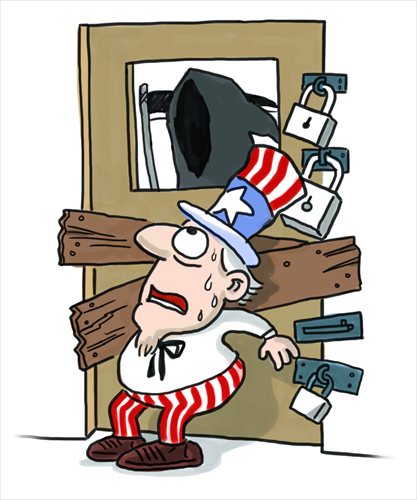HOME >> OP-ED
‘Iron curtain’ useless in curbing epidemic
By Rong Xiaoqing Source:Global Times Published: 2014-10-16 20:33:01

Illustration: Liu Rui/GT
While Ebola makes the whole world shudder, the fear in the US seems to be disproportionately great.
The death of Thomas Eric Duncan, the first and the only Ebola casualty so far on American soil, and the subsequent infection of a nurse who had taken care of him, immediately shattered the confidence of Americans in their top-notch medical system, and left many in a state of paranoia.
An Ebola joke made by a passenger who sneezed caused a US Airways flight from Philadelphia to the Dominican Republic to be held in the airport for a thorough inspection. In New York, workers at LaGuardia Airport held a work stoppage, demanding better protection from the virus as they cleaned planes.
The upcoming flu season could likely make things messier with increasing numbers of false alarms fraying already strained nerves.
A friend witnessed one weird example this week. Someone had vomited in New York's Times Square; not only was everyone gingerly stepping around the mess on one of the busiest sidewalks in the city, but many were talking openly about whether it could be from someone suffering from Ebola. And this in a city where there hasn't been one case.
Fifteen minutes later, rather than cleaning workers having cleared up the mess, as you would normally expect, the vomit had been left on the street, but was now surrounded by traffic cones.
Lawmakers, under great pressure to do more to curb the threat, have been pushing for an "iron curtain." 27 Representatives and Senators sent a letter to President Barack Obama last week, asking him to ban flights from the heavily infected West African countries, Sierra Leone, Guinea and Liberia. And a survey released by NBC News found 58 percent of Americans support the idea.
It is hard to be completely calm when we are facing a deadly virus that has no effective cure. But panic often leads to irrational overreaction, of which a travel ban would be a perfect example.
Even without considering the well-being of the people living in the infected areas and only judging based on the interests of people living in the US, such a ban wouldn't be a good option.
In this highly connected world, barriers to entry can be ineffective and counterproductive. A ban would only raise the incentive for those who could smuggle people in through a third country.
The US' own citizens could also be stuck in the infected countries, and those countries would be badly isolated, cutting off international relationships, freezing private investments and severing trade ties.
But more importantly, a top-down policy like that could easily trigger systematic discrimination within the US that could do a lot more harm than good.
An unpleasant tendency in public health in the US is that minorities are often victimized. When a contagious disease can be easily controlled within an ethnic community, the general public pays it little attention.
That neglect offers the opportunity for the virus to grow. Once it is a threat to mainstream society, the community concerned is further isolated and victimized.
For example, Hepatitis B, a disease that affects Asians more than people from other racial backgrounds, was more prevalent in the US than in many developing countries in Asia during much of the 1980s and early 1990s.
This was because after the development of a vaccine in the 1980s, many Asian countries immediately mandated it for children it. But in the US, Hepatitis B, which is transmitted mainly through blood transfusions and mainly from mother to baby, was considered an "Asian disease" for a long time. The vaccine was not part of the immunization requirement for school enrollment until 1994.
But during the SARS epidemic that ravaged China in 2003, New York's Chinatown saw its business drop rapidly. Despite the fact there were no cases of SARS diagnosed there, tourists and others swore off the area, worried that Chinatown residents could have traveled to China and brought back the virus, which is transmitted through the respiratory system.
Such a bias would only be intensified by an official restriction on the part of the federal government.
Take AIDS. Based on inadequate, inaccurate knowledge of how HIV is transmitted, the US banned people infected with the virus from getting a green card, citizenship or simply entering the country for 22 years until Obama lifted the ban in 2010.
The ban had little effect in curbing the spread of HIV. Numerous people infected with the virus just simply lied at immigration. Those who had means hired others to take the blood test required for a green card or citizenship application.
Newly arrived, low-income immigrants without the means to game the system became the only victims. Right after Obama announced the repeal of the ban, I interviewed a man from Fujian Province, East China, who is HIV positive.
He covered his face and started to howl uncontrollably when he learned the news. Shunned by his family and friends and carrying the stigma alone because of the infection, the man had up until this point not applied for a green card, out of fear he would be deported because of his infection.
The author is a New York-based journalist. rong_xiaoqing@hotmail.com
Posted in: Columnists, Viewpoint